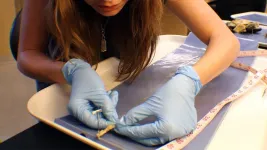(Press-News.org) New research finds there is significant variation in the anatomy of the human digestive system, with pronounced differences possible between healthy individuals. The finding has implications for understanding the role that the digestive tract’s anatomy can play in affecting human health, as well as providing potential insights into medical diagnoses and the microbial ecosystem of the gut.
“There was research more than a century ago that found variability in the relative lengths of human intestines, but this area has largely been ignored since then,” says Amanda Hale, co-first author of the study and a Ph.D. candidate at North Carolina State University. “When we began exploring this issue, we were astonished at the extent of the variability we found.”
“If you’re talking to four different people, odds are good that all of them have different guts, in terms of the relative sizes of the organs that make up that system,” says Erin McKenney, corresponding author of the study and an assistant professor of applied ecology at NC State. “For example, the cecum is an organ that’s found at the nexus of the large and small intestine. One person may have a cecum that is only a few centimeters long, while another may have a cecum the size of a coin purse. And we found similar variability for many digestive organs.”
In another striking example, the researchers found that women tend to have longer small intestines than men.
“Because having a longer small intestine helps you extract nutrients from your diet, this finding supports the canalization hypothesis, which posits that women are better able to survive during periods of stress,” says Hale.
“Given that there is more variation in human gut anatomy than we thought, this could inform our understanding of what is driving a range of health-related issues and how we treat them,” says McKenney. “Basically, now that we know this variability exists, it raises a number of research questions that need to be explored.”
For this study, the researchers measured the digestive organs of 45 people who donated their remains to the Anatomical Gifts Program at the Duke University School of Medicine.
In addition to shedding light on the unexpected variability in human anatomy, this project also led to rediscovering the importance of teaching anatomical variation to medical students.
“It’s particularly important in medical training, because if students are only learning about a ‘normal’ or ‘average’ anatomy, that means they are not going to be familiar with the scope of human variation,” says Roxanne Larsen, co-author of the paper and an associate professor of veterinary and biomedical sciences at the University of Minnesota. “It’s increasingly clear that the medical field is moving toward individualized medicine to improve patient outcomes and overall health and well-being. Garnering experience in understanding anatomical variation can play a critical role in helping future doctors understand the importance of individualized medicine.”
“We’re excited about this discovery and future directions for the work,” McKenney says. “It underscores just how little we know about our own bodies.”
The paper, “Hidden Diversity: Comparative Functional Morphology of Humans and Other Species,” will be published April 24 in the open-access journal PeerJ. The paper was co-authored by Janiaya Anderson, a former undergraduate at NC State; Colleen Grant, a former research scientist at NC State; and by Rob Dunn, William Neal Reynolds Distinguished Professor of Applied Ecology and Senior Vice Provost for University Interdisciplinary Programs at NC State.
END
Study finds significant variation in anatomy of human guts
2023-04-24
ELSE PRESS RELEASES FROM THIS DATE:
As “deprescribing” medicines for older adults catches on, poll shows need for patient-provider dialogue
2023-04-24
As the movement toward “deprescribing” medications among older adults grows, a new poll shows strong interest in this idea.
A full 80% of adults aged 50 to 80 would be open to stopping one or more of the prescription medicines they’ve been taking for more than a year, if a health care provider said it was possible. Already, 26% said they have done so in the past two years.
Of those willing to stop a medicine, 67% said they would likely ask for advice about doing so at their next visit with a provider, according to the new ...
If it pays to be a jerk, why isn’t everyone that way?
2023-04-24
DURHAM, N.C. -- Throw a tantrum. Threaten, shove aside or steal from your colleagues. Science confirms, yet again, that brutish behavior can be an effective path to power. And not just in humans, but in chimpanzees, too.
A new study appearing April 24 in the journal PeerJ Life and Environment found that male chimps with more bullying, greedy and irritable personalities reached higher rungs of the social ladder and were more successful at siring offspring than their more deferential and conscientious counterparts.
But if that’s the case, researchers ask, why isn’t every chimp a bully?
A team led by researchers at the ...
New neurosurgery research: Surgical versus nonsurgical treatment of pituitary apoplexy
2023-04-24
The first prospective study comparing outcomes in patients with pituitary apoplexy—sudden bleeding or death of a pituitary tumor—found that patients managed medically fared as well as those treated surgically in the majority of cases. The multicenter international study, led by Cedars-Sinai investigators, was presented today at the American Association of Neurological Surgeons Scientific Meeting in Los Angeles.
“This is the best data to date on the question of surgery versus medical management in patients with this rare but serious condition,” said Adam Mamelak, MD, co-director ...
AAAS announces winners of the inaugural Mani L. Bhaumik Breakthrough of the Year Award
2023-04-24
The American Association for the Advancement of Science’s (AAAS) inaugural Mani L. Bhaumik Breakthrough of the Year Award — focused on standout contributors to NASA’s James Webb Space Telescope (JWST) — honors three individuals who supported vast swaths of the JWST community over decades and whose persistence amid multiple setbacks ensured the mission’s completion.
The award recognizes Major General Charles Frank Bolden Jr., USMC (Ret), a former administrator of the National Aeronautics and Space Administration (NASA); John Mather, senior project scientist of the JWST since 1995; and Bill Ochs, JWST project manager from 2011 through the telescope’s ...
Do vitamin D levels affect the body’s response to anti-cancer immunotherapy?
2023-04-24
Study’s findings suggest that maintaining normal vitamin D levels may benefit patients.
New research indicates that for patients with advanced skin cancer, it may be important to maintain normal vitamin D levels when receiving immunotherapy medications called immune checkpoint inhibitors. The findings are published by Wiley online in CANCER, a peer-reviewed journal of the American Cancer Society.
Vitamin D has many effects on the body, including regulation of the immune system. To see whether levels of vitamin D might impact the effectiveness of immune checkpoint inhibitors, investigators analyzed the blood of 200 patients with advanced melanoma both before and every 12 weeks ...
Drug combination restores ability of leading treatment to signal for death of blood cancer cells
2023-04-24
Despite the promise of new medications that promote cancer cell death in people with acute myeloid leukemia, leukemic cells often adopt features that let them evade the drugs’ effects within a year.
Now, new research using human tissue samples and mouse models has found that resistance of leukemia cells to a widely prescribed drug called venetoclax occurs because of a rapid increase in the breakdown and turnover of mitochondria, structures inside the cell that help power its functions. In addition to their role in producing energy, mitochondria also tell cells to die under certain adverse conditions.
This process of “programmed cell ...
Increased risk of testicular cancer in people with neurodevelopmental disorders
2023-04-24
A new study by researchers at Uppsala University and Uppsala University Hospital shows that men who have a neurodevelopmental disorder, such as autism and ADHD, also have a slightly increased risk of testicular cancer, or seminoma. This is the first study to show such a link, with the results to be published in the British Journal of Cancer.
Testicular cancer is the most common form of cancer in young men, and its underlying causes are still largely unknown.
“As testicular cancer can be surgically removed, thus curing the disease, it is important to seek care in time if you feel a lump in your testicle,” notes Ingrid ...
Single CT scan in kids low risk for cancers, but 4 or more CTs increases risk
2023-04-24
For children under age 18 years, a single computed tomography (CT) scan is not associated with an increased risk of brain tumours, leukemia or lymphoma, but exposure to 4 or more scans before adulthood more than doubles the risk, according to new research https://www.cmaj.ca/lookup/doi/10.1503/cmaj.221303 in CMAJ (Canadian Medical Association Journal).
Computed tomography in children has increased worldwide in recent decades, but there is conflicting evidence about the risks of cancer from these ...
New programmable smart fabric responds to temperature and electricity
2023-04-24
A new smart material developed by researchers at the University of Waterloo is activated by both heat and electricity, making it the first ever to respond to two different stimuli.
The unique design paves the way for a wide variety of potential applications, including clothing that warms up while you walk from the car to the office in winter and vehicle bumpers that return to their original shape after a collision.
Inexpensively made with polymer nano-composite fibres from recycled plastic, the programmable fabric can change its colour and shape when stimuli are applied.
“As a wearable material alone, it has almost infinite potential ...
International study recommends replacing skull section after treatment for a brain bleed
2023-04-23
A major international trial has concluded that, where possible, surgeons should replace the removed section of the skull following surgery to treat a form of brain haemorrhage. This approach will save patients from having to undergo skull reconstruction further down the line.
The RESCUE-ASDH trial, funded by the UK’s National Institute for Health and Care Research (NIHR), involved 40 centres in 11 countries and involved 450 patients. The results of the trial are published today in the New England Journal of Medicine and are announced at the annual meeting of the American Association of Neurological ...




